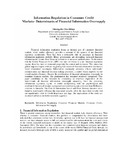Information regulation in consumer credit markets– determinants of financial information oversupply

View/
Date
2011Author
Biza-Khupe, S.
Publisher
EuroJournals Publishing, http://www.eurojournals.com/REFAS.htmLink
Information regulation in consumer credit markets– determinants of financial information oversupplyType
Published ArticleMetadata
Show full item recordAbstract
Financial information regulation forms an integral part of consumer financial
markets, while market efficiency provides a measure of the aptness of any financial
regulatory architecture. There has been a noticeable shift in paradigm in financial
information regulation globally. Many governments are demanding increased financial
information disclosures from financial institutions to investors and borrowers. To the extent that the Global Financial Crisis (GFC) has been attributed to a lax financial regulatory regime, there has been an increased propensity for control and disclosure. This stance has gained impetus despite evidence suggesting that increased financial information disclosures breed information oversupply. Information oversupply adversely effects individuals’
rationalisation and financial decision-making processes, a matter which impedes on the
overall market efficiency. Despite the proliferation of financial information oversupply in
consumer financial markets, this phenomenon has remained relatively unexplored. This
paper contributes to the literature by conducting an empirical exploration of the
determinants of financial information oversupply emanating from the prevailing
information regulatory regime. A model incorporating both the psychological and cost/benefit theoretical streams is proposed and tested using data collected from Melbourne
residents in Australia. The Cost of Information Search and Prior Memory Structure were found to significantly influence the dependent variable, while the dependent variable did not significantly relate to Credit Experience and Age. The implications of the study are
discussed and areas for further research suggested.
